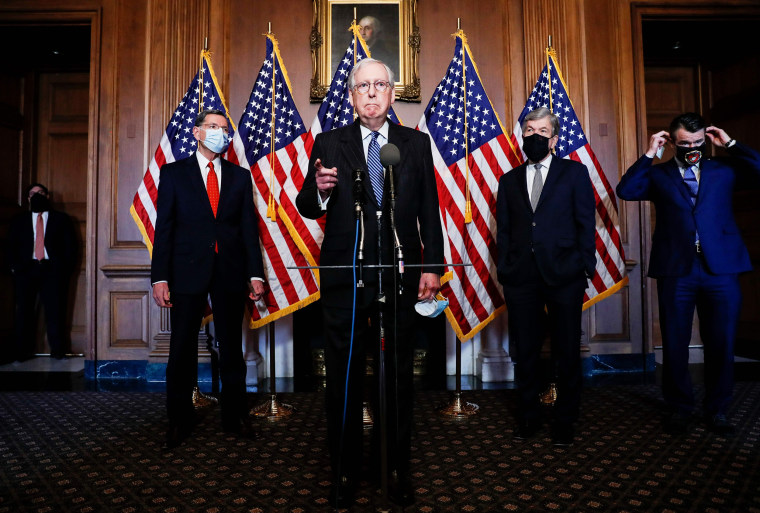House Democrats passed a bill this week to send millions of Americans $2,000 direct-aid payments. Donald Trump has repeatedly endorsed the idea. And yesterday, Senate Majority Leader Mitch McConnell (R-Ky.) unveiled a bill in his chamber that would deliver on the popular goal.
But the Kentucky Republican first intends to add a couple of poison pills.
[McConnell] unveiled a bill that combines Trump's three demands — it boosts the payments to $2,000, repeals an internet liability law known as Section 230 and sets up a commission to investigate the election. "This week, the Senate will begin a process to bring these three priorities into focus," he said.
According to the text of the new legislation, circulated late yesterday by a Democratic leadership aide, McConnell has effectively drafted a ransom note: senators can vote on the increased direct-aid payments, but only if he can add unrelated provisions that would make Donald Trump happy.
One would establish an 18-member congressional commission to investigate election fraud that did not occur in reality. The other would eliminate Section 230 of the 1996 Communications Decency Act, which protects online companies from being sued into oblivion. (Imagine a landscape in which people could sue Facebook, for example, if they felt libeled by something someone had written about them.)
To be sure, there's room for a credible debate about possible reforms to the existing Section 230 policy, but that would take time and careful consideration. Because Twitter hurt Donald Trump's feelings, Republicans prefer to simply scrap the provision altogether, without pesky hearings or serious efforts at policymaking, tacking it on to an unrelated proposal.
This is not some kind of clumsy attempt at a compromise, with McConnell trying to trade a conservative goal for a progressive one. Rather, this is intended as sabotage: the Senate Republican leadership wants to kill the $2,000 checks, and they see these poison pills as the most convenient way to make the popular idea go away.
Senate Minority Leader Chuck Schumer (D-N.Y.) called it a "cynical gambit," which is an entirely accurate summary. McConnell is reluctant to simply ignore the direct-aid proposal -- in part because Trump keeps voicing support for the measure, and in part because it would affect next week's Senate runoff elections in Georgia -- and he sees these poison pills are a more convenient way to reach his goal.
There is, of course, a more direct approach: McConnell could simply bring the House's CASH Act (the "Caring for Americans With Supplemental Help Act") to the Senate floor. It'd need 60 votes to advance, and by accounts, the bill isn't close to clearing that threshold, at least not yet.
But this route would leave Republicans responsible for killing a popular idea, touted by, among others, their own party's president. McConnell clearly prefers the more cynical approach that would have the same effect, but would make it easier for GOP senators to pretend failure wasn't their fault.
For his part, Sen. Bernie Sanders (I-Vt.), the chamber's most enthusiastic proponent of $2,000 direct-aid checks, intends to delay a vote on overriding the president's veto of defense spending, insisting that senators can fund the military after they consider the economic-relief measure. The Vermont's senator's plan would, among other things, likely interfere with senators' holiday plans this week.
The current Congress expires this weekend, and any unresolved bills would die when the clock runs out. Tick tock.
